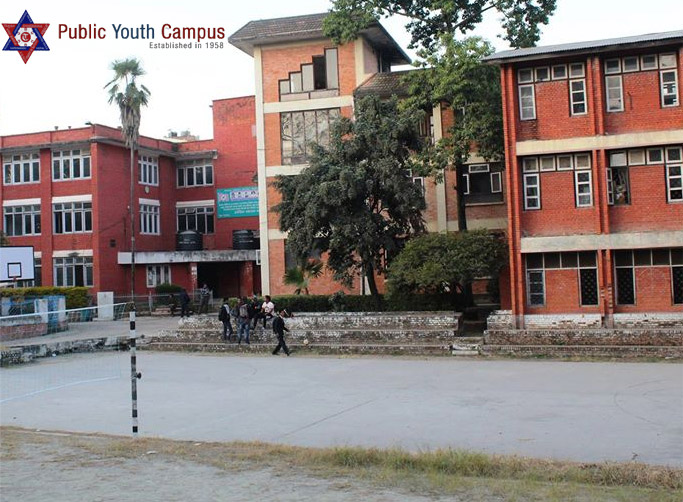Overview
Public Youth Campus (PYC) has been a foundation of management education in Nepal since its founding under the New Education System Plan. As a constituent campus of Tribhuvan University's Faculty of Management, PYC has significantly shaped the country's educational landscape. It is one of Nepal's Top 10 Business Schools, accredited by Asia Education Review 2024.
Established: 1971, Dhobichaur, Kathmandu, Nepal
Affiliation: Tribhuvan University (Faculty of Management)
PYC is a constituent unitary management campus of Tribhuvan University (TU). The PYC offers management bachelor's programs (BBA, BBM, BBS, and BTTM) and master's programs (MBM, MBS, and MTTM). It is fully dedicated to producing skillful managers and entrepreneurs for the betterment of the country. It is a decentralized campus directed by its independent management committee and governed by its executive committee.
PYC emphasizes a robust educational experience molded by self-control, dedication, zeal, insights, curiosity, and inventiveness that can withstand the rigors of the modern world. Its teaching and learning modules include lectures, group discussions, presentations, field trips, personality development, and other life skills for professional advancement.
It encourages students to enroll in demanding courses to gain the required knowledge and skills to compete in the global market. PYC is dedicated to offering 21st-century management education that is goal-oriented, practical, grounded in values, and the best human resources available. It has demonstrated that students who complete their academic program on the PYC campus will be qualified to take on significant responsibilities on a national and international level and will have excellent standing.
With the collaboration of national and international institutions, its future direction is to provide more vibrant and enriching teaching, learning, and research environments, state-of-the-art infrastructure, well-equipped computer laboratories, and a business incubation center that stimulates entrepreneurship and innovation.
The campus also envisions offering students fully digitalized, 21st-century-friendly educational services and believes in incorporating research findings to make the learning process more effective. The strong research department has been constantly publishing a research journal called the PYC Journal of Management (a two-star-rated journal). It has developed a supportive and collegial community to nurture students' educational, personal, social, and cultural growth.
Academic Environment
PYC fosters an atmosphere rooted in cooperation, understanding, trust, and commitment between professors and students. This collaborative environment has helped the campus remain free from political disturbances and provides a focused setting for academic pursuits.
Undergraduate Programs
To meet the evolving demands of the business world, PYC offers four-year undergraduate courses:
| Programs | Seats |
| Bachelor of Business Studies (BBS) | 1000 |
| Bachelor of Business Administration (BBA) | 99 |
| Bachelor of Business Management (BBM) | 84 |
| Bachelor of Travel and Tourism Management (BTTM) | 84 |
These programs empower students with essential skills and knowledge to excel in various fields.
Master's Programs
PYC also provides advanced two-year postgraduate courses:
| Programs | Seats |
| Master of Business Studies (MBS) | 240 |
| Master of Business Management (MBM) | 44 |
| Master of Tourism and Travel Management (MTTM) | 44 |
Aligned with Tribhuvan University standards, these courses offer in-depth insight into advanced business concepts and industry-specific expertise.

History of Public Youth Campus
Public Youth Campus (PYC) has a notable record of meeting Nepal’s growing demand for business management education. Since the early 1950s, Nepal’s abrupt shift to democracy has highlighted the urgent need for skilled professionals in accounting, insurance, audit, commercial correspondence, trade operations, franchising, agency businesses, and typing/shorthand.
1954 AD (2011 BS): A small Commerce Department began at Tri-Chandra College (TC) but could not keep up with the increasing demand.
1958 AD (2015 BS): Tri-Chandra’s Commerce Department Faculty members established Public Commerce College (PCC) to bridge the gap. Founding figures included Trailokya Man Singh Pradhan, Upendra Bahadur Pradhanang, Gehendra Bahadur Rajbhandari, Khem Ranjan Baral, and Mr. Gopal Man Shrestha.
Early Challenges
Classes were initially conducted only in the mornings and evenings, in line with the “Learn While You Earn” approach—similar to Tri-Chandra’s schedule. PCC used Tri-Chandra’s premises early on and later moved to a cinema building in Thamel.
Expansion and Relocation
1962 AD (2019 BS): New faculty joined PCC, including Aishwarya Lal Pradhanang, Yugeswar Prasad Verma, Srawan Kumar Singh, Krishna Bhadra Sharma, Moti Kaji Sthapit, and others.
Dhobichaur, Kathmandu: Mr. Shyam Krishna Bhattarai, then Secretary for the Ministry of Education, helped PCC acquire land and a building, supplementing government funds with the college’s savings.
Formation of Public Youth Campus
1972 AD (2029 BS): Nepal’s Ministry of Education introduced the New Education System Plan (NESP), integrating many private colleges into Tribhuvan University (TU).
Public Commerce College (PCC) and Nepal Youth College (NYC) combined under TU’s oversight to form the Public Youth Campus (PYC). With Mr. Gopal Man Shrestha (PCC) and Mr. Tirtha Ratna Bajracharya (NYC) as key figures and Mr. A.L. Pradhanang representing PCC’s interests, TU approved the union.
No movable or immovable property transfer occurred; PCC’s building at Dhobichaur became PYC's official location.
Implementing the Semester System
Under NESP, PYC and other campuses had to adopt a semester-based curriculum, which demanded new academic calendars, workshops, and faculty orientations.
Institute of Business Administration, Commerce, and Public Administration (IBACPA): Part of this plan, led first by Dean Dr. Prachand Pradhan and later by Mr. Upendra Bahadur Pradhanang, was housed at Shankar Dev Campus, then moved to PYC, and later to Mahendra Morang Adarsha Multiple Campus, Biratnagar.
Leadership and Growth
Campus Chiefs: Mr. Aishwarya Lal Pradhanang served two terms (2029–2036 BS), followed by Mr. Nilkantha Lal Shrestha.
Early NESP Era: PYC and other BACPA campuses were cooperative and competitive. They aimed for high student enrollment, strong exam results, and organized premises. They also celebrated Commerce Day and upheld TU guidelines.
Salient Features
-
Courses balance rigorous theory with practical application to prepare students for real-world challenges.
-
A complex learning atmosphere hones problem-solving skills, which are vital for success in the business sector.
-
PYC supports scholarly inquiry and fosters a culture of research within business and management.
-
Clean, organized facilities create a positive environment that promotes effective learning.
- An extensive collection of course books and reference materials aids students and faculty in research and study.
Admission Guidelines
Below are the general admission procedures and eligibility criteria for each program:
Master of Business Studies (MBS)
Eligibility:
- BBS or bachelor's degree in any discipline from Tribhuvan University or a recognized university.
Admission Procedure:
- Apply with personal/academic details.
- Appear for CMAT (similar to GMAT/GRE) testing verbal ability, quantitative ability, business, economics, and general awareness.
- Must score a minimum of 40% in CMAT.
Master of Business Management (MBM)
Eligibility:
- Bachelor's degree in BBM, BBA, BTTM, BBS, BPA, BMS, BHM, or equivalent with a minimum CGPA of 2.0 or second division marks.
- Students awaiting final results may apply but must present a passing certificate upon admission.
Master of Tourism and Travel Management (MTTM)
Eligibility:
- Bachelor's degree with at least a 2.0 CGPA or 45% in the annual system.
Admission Process:
- Competitive entry involves a CMAT written test, group discussions, individual presentations, and personal interviews.
Bachelor of Travel and Tourism Management (BTTM)
Eligibility:
- 10+2 completion from a recognized institute, with English as a whole subject.
Admission Process:
- Pass CMAT conducted by TU with at least 35% marks.
- Written test, group discussion, and interview.
Bachelor of Business Administration (BBA)
Eligibility:
- Minimum second division in 10+2, PCL, or equivalent.
- Students who have completed the first year and await second-year results can also apply.
Admission Process:
- Written test and interview.
Bachelor of Business Studies (BBS)
Eligibility:
- PCL/+2 in Commerce from HSEB, TU, or a recognized board with English as a full paper.
- Must fulfill any additional entrance requirements.
Bachelor of Business Management (BBM)
Eligibility:
- 10+2 or equivalent with second division (45% and above) or 1.8 CGPA.
Admission Process:
- Apply with personal/academic details.
- Three-stage screening: written test, individual presentation, personal interview.
- CMAT (SAT format) tests verbal/quantitative skills.
- The final selection is based on a 60% CMAT score, 30% from +2 marks, and 10% interview.
FAQ:
Where is the Public Youth Campus located?
Public Youth Campus is at Yapikhya Marg, Chettrapati, Dhobichaur, Kathmandu, Nepal.
Which university is the Public Youth Campus affiliated with?
Public Youth Campus is a constituent campus of Tribhuvan University (TU), specifically under the Faculty of Management.
What year was the Public Youth Campus established?
Public Youth Campus was established in 1971 (2028 BS) as part of the New Education System Plan.
What courses are offered at the Public Youth Campus?
The campus offers various programs: BBM, BBS, BTTM, BBA, MBS, and MBM.
What are the requirements for admission to Bachelor (UG) programs?
Candidates must have held 10+2 with English as a subject from a recognized institute. They must also pass the CMAT exam and undergo a written test, group discussion, and interview.
What are the eligibility criteria for the Master of Business Studies (MBS) program?
Applicants must have completed a Bachelor of Business Studies (BBS) or equivalent degree from Tribhuvan University or other recognized institutions.
Is there a library available at the Public Youth Campus?
Yes, the Public Youth Campus has a fully-equipped library that provides course books and other student resources.
What is the focus of the educational experience at the Public Youth Campus?
The campus emphasizes high academic standards and practical application to provide a top-quality educational experience.
What are the notable features of the Public Youth Campus?
The campus is known for its excellent research environment, well-maintained classes, and commitment to providing a challenging and competitive academic atmosphere.
Contact Information
For details on courses, admissions, fees, scholarships, or eligibility, reach out to:
Address: Yapikhya Marg, Dhobichour, Chhetrapati, Kathmandu, Nepal
Phone: +977-1-5351207, +977-1-53650992, +977-9851326760
Website: www.pyc.edu.np
Email: [email protected]


















